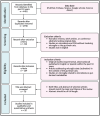Exploring the Role of Microglial Cells in the Gut-Brain Axis Communication: A Systematic Review
- PMID: 40662222
- PMCID: PMC12261042
- DOI: 10.1111/jnc.70154
Exploring the Role of Microglial Cells in the Gut-Brain Axis Communication: A Systematic Review
Abstract
The gut-brain axis (GBA) is a bidirectional communication system between the gastrointestinal tract and the CNS, playing a key role in neurological function, immune response, and metabolism. Microglia, the resident immune cells in the brain, are crucial regulators of neuroinflammation and synaptic plasticity. Recent studies indicate that the gut microbiota modulates microglial activity through metabolic and immune pathways, with implications for neurodegenerative, neurodevelopmental, and psychiatric disorders. However, the mechanisms underlying microbiota-microglia interactions remain unclear. Following a systematic screening of 4481 studies, 20 preclinical studies met the inclusion criteria and were reviewed in depth to assess microbiota-microglia interactions. These studies were found by searching in PubMed, Science Direct, and Google Scholar. The findings synthesize results from 20 carefully selected studies examining the impact of gut microbiota on microglial function. Experimental models, including fecal microbiota transplantation, dietary interventions, and bacterial supplementation, were analyzed. Microglial activity was assessed through immunohistochemistry, gene expression profiling, and functional assays. Most studies suggest that gut dysbiosis promotes microglial overactivation and neuroinflammation through pathways involving microbial-derived short-chain fatty acids (SCFAs), bile acids, and neuroimmune signaling cascades such as TLR4/NF-κB and the NLRP3 inflammasomes, whereas microbiota-targeted interventions reduce inflammation and support cognitive function. Despite these promising findings, inconsistencies in study methodologies and microbiota analyses limit comparability and clinical translation. This review offers a unique synthesis of studies specifically linking gut microbiota alterations to microglial states, neuroinflammatory signatures, and cognitive outcomes across diverse experimental models. It highlights the therapeutic potential of microbiota-based strategies for modulating microglial function and mitigating neuroinflammatory diseases.
Keywords: cognitive function; gut microbiota; gut–brain axis; microglia; neurodegeneration; neuroinflammation; short‐chain fatty acids.
© 2025 The Author(s). Journal of Neurochemistry published by John Wiley & Sons Ltd on behalf of International Society for Neurochemistry.
Conflict of interest statement
The authors declare no conflicts of interest.
Figures
Similar articles
-
Jing An decoction alleviates neuroinflammation in Tourette syndrome by regulating butyrate-mediated microbiota-gut-brain axis.Phytomedicine. 2025 Sep;145:157009. doi: 10.1016/j.phymed.2025.157009. Epub 2025 Jun 23. Phytomedicine. 2025. PMID: 40674913
-
Gut microbiota-driven neuroinflammation in Alzheimer's disease: from mechanisms to therapeutic opportunities.Front Immunol. 2025 Jun 26;16:1582119. doi: 10.3389/fimmu.2025.1582119. eCollection 2025. Front Immunol. 2025. PMID: 40642089 Free PMC article. Review.
-
Therapeutic potential of atorvastatin in ischemic stroke: an investigation into its anti-inflammatory effect by targeting the gut-brain axis.J Transl Med. 2025 Jul 8;23(1):750. doi: 10.1186/s12967-025-06803-w. J Transl Med. 2025. PMID: 40629397 Free PMC article.
-
Modulating the Gut Microbiota to Target Neuroinflammation, Cognition and Mood: A Systematic Review of Human Studies with Relevance to Fibromyalgia.Nutrients. 2025 Jul 9;17(14):2261. doi: 10.3390/nu17142261. Nutrients. 2025. PMID: 40732886 Free PMC article. Review.
-
BHBA attenuates endoplasmic reticulum stress-dependent neuroinflammation via the gut-brain axis in a mouse model of heat stress.CNS Neurosci Ther. 2024 Jul;30(7):e14840. doi: 10.1111/cns.14840. CNS Neurosci Ther. 2024. PMID: 38973202 Free PMC article.
References
Publication types
MeSH terms
Grants and funding
LinkOut - more resources
Full Text Sources
Miscellaneous


